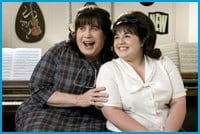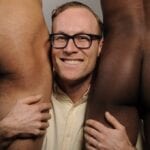
FAT SUIT. John Travolta (left) buries his true self under layers of foam rubber and latex to play Edna Turnblad opposite Nikki Blonsky as Tracy Turnblad in Hairspray.
July saw the release of two big-budget, feel-good, tolerance-toting Hollywood gay comedies: Hairspray and I Now Pronounce You Chuck and Larry. While I was initially looking forward to ripping them to shreds, I was surprised by both of them, albeit in different ways.
I Now Pronounce You is a strange bird indeed, a perfect example of Hollywood begging the approval of very different audiences (basically, Adam Sandler fans and the gays) in very different ways. It is, ultimately, a cloddish plea for gay rights that is not quite as bad as everyone says. Near schizophrenic in its erratic teetering between silly and sophisticated, it tries so hard to please everyone that it ultimately pleases no one.
We start on a low-note: Shrill twin sluts compete for the attention of mischievous man-whore Chuck Levine (the ever-smirking Sandler). Moments later Chuck and his best friend and firefighting partner Larry Valentine (Kevin James) are rescuing a morbidly obese man from a blaze, cracking fat jokes all the way — corpulent Larry is on the receiving end of several hundred as well — in an unforgivably lazy slapstick sequence.
If the trailers have you wondering how getting gay-married could be a boon for anyone south of the border, allow me to explain the convoluted premise. After his wife passed away, Larry was too grief-stricken to transfer his pension to his kids within the requisite one-year window. Now, marriage is the easiest way to name a new beneficiary, and there is no woman Larry trusts more than best buddy Chuck. When Larry saves him from a serious fall, he is emboldened to cash in a favour and ask Chuck to register as his domestic partner. When the ‘crats start sniffing around the über-straight gay couple for fraud, hot lawyer Alex (Jessica Biel) advises them to get married in Canada.
There are actually some funny lines in here — seriously — as long as you are generous enough to look at the movie not as homophobic but as making fun of the impoverished stereotypes that stupid straight guys have of fags.
For example, to explain his feigned gay identity Chuck bashfully claims, “When I used to climb the rope in gym class I wished it was a guy,” while Larry suggests they buy maxi-pads on their shopping spree — along with the Crisco and a plunger — as “gay trash” to put out for investigating official (a lethargic Steve Buscemi) to rifle through.
Some jokes, however, like Chuck threatening to make a lollipop by sticking a pole up Larry’s effeminate young son’s ass are irrecoverable. In other bad news, Sandler gave pity roles to Lance Bass and to Rob Schneider as an “Asian” Niagara Falls wedding chapel proprietor. Shudder.
A clever recurring gag is Chuck’s chagrin over everybody instantly assuming that he is the “chick” in their relationship, which does earn him some QT with Alex, and his reluctant acceptance of being identified as a “chubby chaser.” Alex is the only female character who isn’t either a slag or an ogre.
An AIDS benefit the guys attend will set your phobey-senses tingling, but the duo are soon humbled at how the gay men are “freakin’ Travoltas” compared to them, and they hide their awful hetero dancing skills in a hurry. As their fight for benefits intensifies and they become gay rights poster boys, there is something quite appealing about watching these macho men beat the living shit out of anyone who calls them — and eventually, anybody — faggots.
Unfortunately, for every gay gag that works, there are several that fall flat. The person who survives this mess best is Kevin James whose character is sympathetic and believable as the priapic Chuck’s pudgy foil. Larry is more likely to spend the evening alone with a can of icing than with harems of women who can’t read or write. An early scene of him preparing a meal featuring “hot dog salad” for flamey, splits-happy son Eric and jocular daughter Tori prepares you for the genuinely poignant material about Larry mourning his late wife.
James’s game performance also shows that, in fact, fat people can be counted on to portray themselves on screen, despite the efforts of the latex industry which scored a coup when John Travolta was cast as portly laundress and long-suffering mother Edna Turnblad in Hairspray.
I firmly believe that Divine, who played the role in John Waters’ original 1988 film, is ethically and aesthetically inimitable. The persona of Divine could only have been the “return of the repressed” of a constantly bullied Elizabeth Taylor-obsessed fat sissy kid, not the product of a multimillion-earning dimpled Scientologist.
Travolta is the weakest link in what is otherwise a totally thrilling, joyful film. The only actor to bother with a thick Baltimore accent, Travolta in his stupid fat suit looks a bit like a distended Lily Tomlin. He speaks with a nasally, airy voice that underplays his lines; he might have the moves — Edna is “spry as a slinky” — but he can’t carry a tune or a scene with two exceptions: a romantic interlude with the gonzo Christopher Walken as joke-shop proprietor husband Wilbur, and the grand finale where he sheds the shy whisper and goes full-throttle. But, in general, Travolta is sedate where Divine was a force of nature, melodrama in a housecoat. (Queen Latifah as Motormouth Maybelle also never brings out the big guns, sadly.)
For those unfamiliar, Hairspray is the story of a delightfully plump and high-spirited 1962 teen “hair-hopper” named Tracy Turnblad, who wins a spot as a star dancer on local TV’s The Corny Collins Show and fights to racially integrate it. The big villain is conniving ex-beauty queen Velma von Tussle, the racist and fatphobic TV station manager and mother of top Corny Collins council member, Amber. The epitome of blonde ambition, Amber also happens to be dating Tracy’s biggest crush, smooth operator and living Ken doll, Link.
When Waters directed his original 20 years ago he was accused of selling out, and Adam Shankman’s adaptation of the Broadway musical has certainly polished off any edges that the Pope of Trash’s sensibility once made manifest. (We are obviously even further away from the Manson family and Warhol factory ’60s that birthed Waters’ raging queer atrocities now than we were in 1988.) Everything here is bigger and brighter than life — with better rhythm to boot. It is almost impossible not to like the spectacle, especially as its plastic sheen actually has some substance.
What Shankman’s remake has in spades is songs that are both catchy and cleverly written, a boundless pace and energy — specifically radiating from the raging inferno of pep that is the adorable Nikki Blonsky as Tracy — and plenty of intelligent, campy dialogue. While its edges may be dulled (Waters’ cameo as the flasher next door notwithstanding), there is definitely wit aplenty, whether it be Tracy’s dreamy gaze as she rides a garbage truck to school or the impossibly broad showbiz grin (thank God for widescreen) of pro-integration host Corny Collins (James Marsden).
Besides the fabulous Blonsky, the other kids are uniformly superb, specifically Amanda Bynes as jumpy best friend Penny Pingleton — whose mother is the aptly named hysteric Prudie — and Elijah Kelley as her groovy black boyfriend Seaweed Stubbs. A lot of the best moments come from the film’s take on the culture and music clash between the “nicest [white] kids in town” on TV all week and black folks stuck in detention and forced to shill hair straightener on Corny Collins’s periodic “Negro Days.”
Hairspray’s queer energy and sharp sense of humour ultimately stay with you much longer than does I Now Pronounce You’s hit-and-miss hetero-masculinity in crisis wrapped in crude dick-flick trappings.


 Why you can trust Xtra
Why you can trust Xtra


